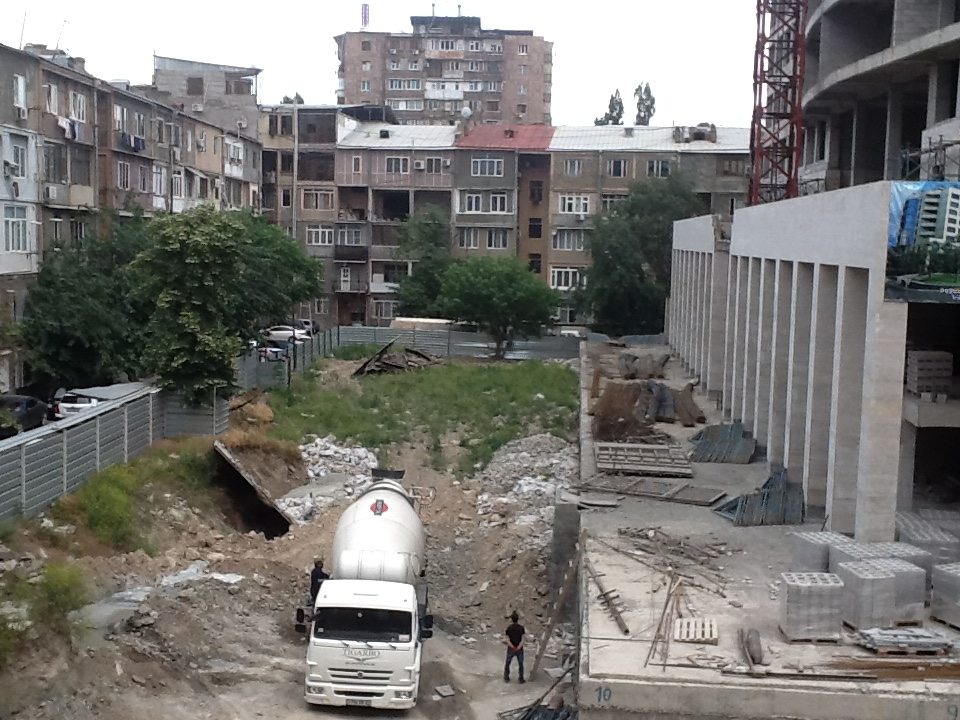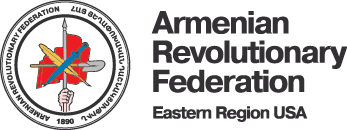A Note from Yerevan on May 28

Special for the Armenian Weekly
It is May 28. It is a day of great significance for the Armenian Nation. In Yerevan, television homage is being paid, through films, songs, dances, discussions, and interviews, to the dedicated men and women who saved this nation from extinction. One cannot help but think of those people who formed Armenia’s First Republic and how in a matter of two brief years accomplished so much under the direst of conditions, while at the same time caring for the survivors of the Armenian Genocide. One can say that the Government of the First Republic, with determination, dedication, sacrifice, selflessness, and vision, performed nothing short of a miracle in rebuilding a tattered and bleeding nation on the verge of extinction.

The people in this large apartment complex no longer have a garden where they can sit, and no place for their children to play.
Numerous tall buildings, overshadowing and strangling Tamanyan’s architectural gems, have been erected since I was here 13 years ago, and many more are being built. Such activity is a good sign, for it means that people are being employed, and as a result, families are not being torn apart. Despite the number of new apartment buildings, there are people who still live in hovels and decrepit, crumbling buildings on the verge of collapse. There are numerous grocery stores, shops, boutiques, eateries and restaurants, even flowers planted here and there, yet there are elderly people who meekly ask for alms. Automobile traffic is heavy, and motorcyclists speed up and down the streets at all hours. Cafes are filled with smartly dressed people enjoying an outing with friends; there are many tourists strolling the streets of Yerevan and also discovering the countryside with its countless antiquities. Cultural life is thriving and it is common to see children attending the opera and other musical and artistic events on weeknights and weekends with their parents. Television programs offer a variety of cultural programs as well. Yet I cannot help but think of the pretty and soft-spoken young girl and her family living in a crumbling, half-collapsed shack—built in the early teens or twenties of the 20th century—that is surrounded by expensive new buildings. “And where will you live once your house is demolished?” I asked her one day.
She shrugged her small, slender shoulders and whispered, “Chgeedem (I do not know),” and she looked down at the weeds and litter before her feet.
An elderly woman on a street corner sells flowers daily—often times withered—from morning until evening. I make certain to buy flowers from her as often as I can. She explained one day that if it were not for her little flower stand, she could not possibly survive on her meager pension. She had moved from Gyumri to Yerevan because it was even more difficult there. A young man from Gyumri works from morning until evening in construction in Yerevan and lives with an uncle, while his wife and children live in Gyumri. It is the only way he can support them. A pleasant young girl working in a restaurant on Sayat Nova Street greets me and then takes my order. When I ask her how things are going, she responds, “We work and work and get nowhere.” Another worker, an older woman, looks my way and nods as she wipes a table. While riding in an old, run-down cab, the taxi driver tells his story—how his sons left in search of work in another country. Downstairs from where my husband and I have rented an apartment, a husband and wife sell fruits and vegetables in their tiny store, and next to them a gaming/betting parlor sells dreams and hopes that seldom come true.
Life in Yerevan is good and it is filled with fun for those who have means, but not so for all those who wish for jobs—anywhere—in order to support themselves and their families. It is May 28 and I think of those selfless men and women who formed the First Republic and accomplished so much in such a short period of time for their beloved Nation and People.
Source: Armenian Weekly Mid-West
